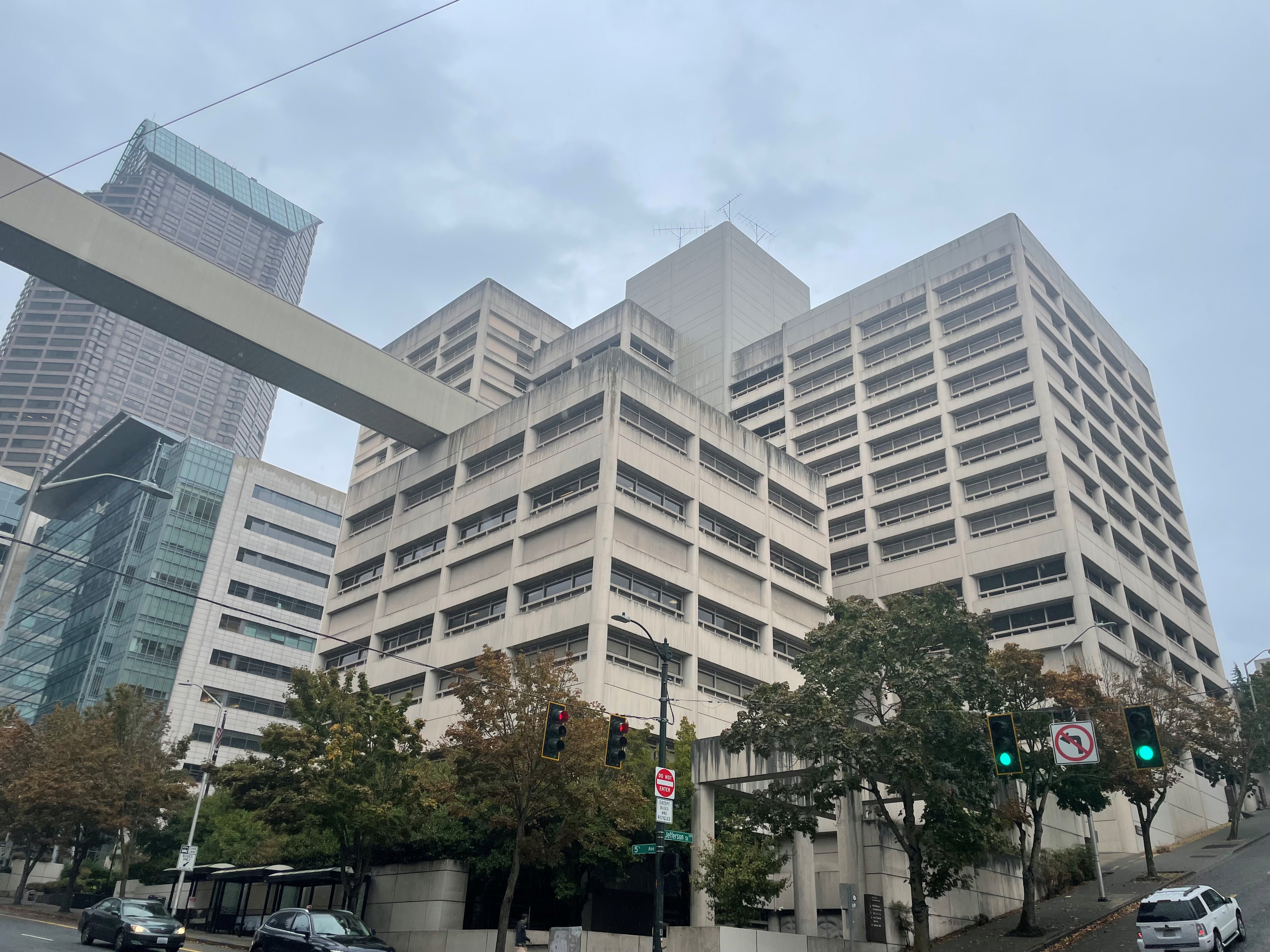 Interim Police Chief Sue Rahr says she supports a new kind of secure detention for drug users, while City Attorney Davison blames jail booking restrictions for persistent problems downtown.
Interim Police Chief Sue Rahr says she supports a new kind of secure detention for drug users, while City Attorney Davison blames jail booking restrictions for persistent problems downtown.
By Erica C. Barnett
Members of the Seattle City Council outdid each other calling for more police, more jail, and harsher punishments for people, like those who sell drugs, who “need to be contained,” as Councilmember Bob Kettle put it, during a meeting of the council’s public safety committee Tuesday morning.
Rob Saka, for instance, blamed the city’s current public safety issues on events from four years ago (and the fact that the King County Jail isn’t booking people for most misdemeanors, but more on that in a second). “The public safety challenges that we’re experiencing today are a shameful legacy of the Defund the Police movement,” Saka said. “And that was wrong then and it’s wrong now. And you know, from my perspective, defund is dead. It is not the dominant, controlling policy narrative dominating our policy discussions.”
After describing his “disadvantaged background,” Saka suggested that school closures during the COVID pandemic were also partly to blame. “There’s no way I would be here the dais right now if I had to rely on remote learning, adding that schools needed to be “the last to close and the first to reopen” during COVID.
Maritza Rivera, not to be outdone, said it made her “really angry” that people selling drugs in Magnuson Park, in her district, aren’t being arrested and jailed. “We need to be booking drug dealers, who are causing the most harm, and then diverting the users who actually need services,” she said. (Research indicates that nearly nine in ten people who sell drugs are also drug users.) “There’s a high school, there’s an elementary and a middle school off of Aurora, and these kids are getting solicited” by sex workers, Rivera added.
Not to be outdone, Council President Sara Nelson said she was “shocked” by the fact that the average daily population at the jail is currently about 80, down from a pre-pandemic average of around 180 to 280. The jail imposed booking restrictions during the pandemic, and has kept those restrictions ever since because there are not enough jail guards to maintain safety standards with a higher inmate population. “I want my money back, basically,” Nelson said.
The purpose of the briefing was for interim Chief Rahr, Davison, and CARE (911) Department Chief Amy Smith—who had just received the committee’s unanimous vote for appointment as permanent chief—to update the council on the “criminal justice ecosystem.”
PubliCola is supported entirely by readers like you.
CLICK BELOW to become a one-time or monthly contributor.
Support PubliCola
Rahr, who has identified hiring more police officers as her primary goal, said the city should help applicants make it past the initial hurdles by adopting a police hiring test that’s more “low-barrier” than the one the city currently uses. Rahr’s comments seemed like an explicit swipe at the Public Safety Civil Service Commission, which has strongly supported keeping the current test, which was designed to help weed out people who are temperamentally unqualified to be officers.
“I know that [the PSCSC] believe deep in their soul that the test they’re using now is extremely important,” Rahr said, but “my experience in police hiring is the first initial screening test doesn’t need to go that deep, because we’re literally just trying to make sure people have the minimum qualifications, [and then] we have a deep backgrounding process.”
In the competition for police officer applicants, she continued, “the agency that makes that removes the most barriers to get in the door is going to have a larger pool.”
As we’ve reported, the PSCSC supports the current test, developed in collaboration with SPD in response to the 2012 federal consent decree, because it was designed to help weed out candidates who would have problems adhering to Seattle’s constitutional policing requirements. Last week, the PSCSC announced that more people applied and passed the exam in June than in any month since 2019.
Davison said that in her view, the reason crime has gotten so bad downtown is that poliec—who now have the authority, thanks to a law adopted last year, to arrest people for misdemeanor drug use—still can’t book people into the downtown jail for misdemeanors like drug possession, smashing windows, or animal cruelty.
Wait—animal cruelty? Davison said she brought up animals because animal cruelty is often a precursor to domestic violence*, and it’s important to catch it early to prevent young people from becoming abusers in the future. Davison did not explain how being locked up in the King County Jail rehabilitates people who commit misdemeanor animal abuse (harming animals is also a gross misdemeanor and a felony, depending on the extent of the abuse), although she did say she was specifically referring to “early interventions” for young people.
Saka called the booking restrictions “a real head-scratcher,” and said that without the threat of jail, there is “no deterrence whatsoever to any crime—zero.” Criminals, he continued, “can violently smash a business’s window without fear of being booked, to spend a night in jail to think about that. … And animal cruelty—they locked Michael Vick up for years for animal cruelty, and in the city of Seattle, someone can’t spend a night in jail? They can freely abuse an animal. We need to do better.” (Vick was convicted of multiple felonies stemming from his involvement in a dog-fighting ring, and served 21 months in federal prison.)
Rivera said she was “super angry that we’re paying for service that we’re not getting,” referring to county jail beds. “We are not trying to jail folks that have addiction—we need to help these folks—but we need to get the people that are causing the most harm, that are taking advantage of our vulnerable populations, and these people need to be in jail.”
Davison did point out that people who wind up in her “high-utilizers initiative” can be booked into jail under an agreement between Seattle and the county.
On Tuesday, Mayor Bruce Harrell proposed a new contract with SCORE, the regional jail in Des Moines, to incarcerate people accused of misdemeanors in Seattle.
The potential contract is controversial. In May, members of the union that represents staff for the King County Department of Public Defense sent a letter to city officials, including the council, opposing the contract, arguing that the regional jail makes it difficult for people to speak to their attorneys and get to court hearings in Seattle, diminishing the quality of representation they receive. As we’ve reported, six people have died in custody at SCORE in just over a year, including at least one from malnutrition and dehydration; SCORE contracts its medical service out to a private company, Wellpath. King County halted its own pilot program to transfer inmates to SCORE last year.
Rahr said she would also support a “third” kind of secure detention facility for people who commit drug-related crimes, including public drug use, separate from jail or diversion programs like LEAD.
“There are some people who are too medically fragile to be booked in jail, but they’re also too dangerous to be left in an emergency room or be left in a community,” Rahr said after the meeting. “If we had a place to take them that was secure, where they could get the medical intervention they need, particularly for people who are on fentanyl… we could significantly improve the conditions on the street” while also getting people “stabilized and connected with the services they need.”
Asked, after the meeting, about her comment that she wanted the city’s money back, Nelson said, “I do want to make sure that the terms of the contract that we have with the jail are being fulfilled. If we are paying for jail services and we are not getting them, what’s the deal? We need some place to take the people who are perpetrating crimes against my constituents.”
In previous years, the city has clawed back funding that would otherwise have paid for empty jail beds and repurposed it for community-based health and housing programs. During the 2022 budget process, the council voted to place a proviso, or hold, on $3 million the city would have otherwise spent on jail beds it wasn’t using, with the intent of putting that money toward inflation on future jail beds or to other, non-jail purposes. Nelson voted against the amendment.
*And certainly not, as we cynically assumed, because Seattle residents care more about dogs than human beings trapped in the carceral system.
Share this PubliCola Post
Like this:
Like Loading...


 Interim Police Chief Sue Rahr says she supports a new kind of secure detention for drug users, while City Attorney Davison blames jail booking restrictions for persistent problems downtown.
Interim Police Chief Sue Rahr says she supports a new kind of secure detention for drug users, while City Attorney Davison blames jail booking restrictions for persistent problems downtown.
 We need your help offsetting the cost of defending ourselves against the former police chief’s lawsuit threat.
We need your help offsetting the cost of defending ourselves against the former police chief’s lawsuit threat.